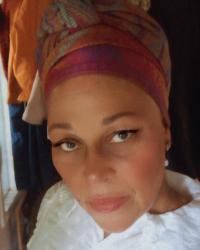
Biography
Decolonizing Anthropology for Global Racial and Transformative Justice
Rachel Chapman is a Black feminist activist anthropologist who uses alternative and native (alter/native), and performative, racial and social justice approaches, and an associate professor of Anthropology at the University of Washington, and adjunct associate professor in Global Health and Gender, Women and Sexuality Studies. Professor Chapman’s research, teaching and service focus on global health disparities, suffering and resistance through an inter-sectional transformative justice lens, as well as identifying and addressing the effects of systemic racism in health institutions, policies and practices on communities of color. Her expertise encompasses race, racism and reproduction; survivance and liberation practices among African and African Diaspora communities; impact of structurally violent economic austerity policies on health and decolonization movements; and reproductive health trauma. She has conducted research in Los Angeles, Cleveland, Mozambique, and Seattle. Her core projects include Black women’s reproductive care-seeking; the impact of gender violence on health; HIV treatment during pregnancy; perinatal care-giving in refugee and immigrant communities; teen peace-making and restorative justice in urban communities.
Her ethnography, Family Secrets: Risking Reproduction in Central Mozambique (2010), documents a decade of women’s post-civil war pregnancy and birth experiences as the HIV/AIDS epidemic exploded. She has published in numerous journals including Social Science and Medicine, Medical Anthropology, and the Journal of AIDS and Society. Since then, she has focused on understanding community and clinic influences of the HIV epidemic on pregnant women and infants; developing models to improve maternal antiretroviral care; and evaluating the impact of new AIDS service delivery models, funded by a competitive three year National Institute of Health (NIH) RO1 grant. Two new grants document Seattle’s East African refugee and immigrant community health needs and test a community-based model of innovative perinatal care with these families. Her latest grant seeks to improve management maternal pre-eclampsia, stress and depression during COVID-19 quarantine.
In her teaching and scholarship, Chapman utilizes community-driven, participatory action and performance methodologies to create classrooms as sacred circles that are also “Liberation Labs.” She calls her approaches to teaching "Alter/Native Anthropology", “Liberation Methodologies”, “Embodied Pedagogy of Engagement” and "Activist Performance."
Research
Selected Research
- Chapman, R. R., Raige, H., Abdulahi, A., Mohamed, S., & Osman, M. (2021). Decolonising the global to local movement: Time for a new paradigm. Global Public Health, 1–14. https://doi.org/10.1080/17441692.2021.1986736
- Healing Heart and Soul:Decreasing COVID-19 Perinatal Health Disparitiesthrough Maternal Self-Monitoring and Reportingof Blood Pressure, Stress, Depression and Safety
- Chapman, Rachel R. 2020. "Therapeutic Borderlands: Austerity, Maternal HIV Treatment and the Elusive End of AIDS in Mozambique." In Medical Anthropology Quarterly. Forthcoming.
- UW Population Health Initiative (PHI). “Mama Amaan (Safe, Peaceful Mother) Project: African Mother to Mother Antenatal Assistance Network (AMMAAN).” Pilot community-based doula intervention to improve antenatal care attendance in the East African community in Seattle. Somali Health Board, Health Alliance International, Parent Trust, UW Global Health, Anthropology, Psychiatry, Pediatrics, Social Work, CSDE.
- “Early ART initiation among HIV-positive pregnant women in central Mozambique.” NIH R01* HD 074557-01. Publication and dissemination ongoing.
- Pfeiffer, J. and Chapman, R. R. 2019. "NGOs, austerity, and universal health coverage in Mozambique." Globalization and Health, 15(1), pp.1-6.
- 2017-2019 Principal Investigator. Royalty Research Fund, UW Office of Research. “Birthing Diversity in Seattle: Modelling Innovative Perinatal Care at the Intersection of Risks, Resources and Resilience to Improve Maternal/Infant Outcomes in Underserved Urban Communities.”
- Chapman, Rachel. 2010. Family Secrets: Risking Reproduction in Central Mozambique. Vanderbilt University Press. Download PDF
- 2023. Chapman, R.R., Mohamed, S.B., Rage, H. et al. Preventing Health Disparities during COVID through Perinatal Home Screening as Black Authoritative Knowledge. J. Racial and Ethnic Health Disparities (2023). https://doi.org/10.1007/s40615-023-01608-3
- Articles, Chapters, Reviews, Continued
- Articles, Chapters, Reviews
- Rachel Chapman: Adviser and Committee Membership List
- Chapman, Rachel. “The End of AIDS”, Austerity and the HIV Treatment Retention Crisis in Africa.”
Research Advised
- Espinoza, Damarys. Sobreviví Como Flor De La Sierra: Women, Violence, and Resistance in Peru. Diss. U of Washington, 2014.
- Eloheimo, Marja. Community-Based Herbalism and relational approaches to harm reduction in healthcare. Diss. U of Washington, 2014.
- Walls, Baya. Leidensdruck: Gender Reassignment Surgery, Sociocultural Factors, Economic Issues, and Life Quality of Transgender Individuals in the United States and Germany. 2013. Senior Anthropology Honors Thesis, University of Washington, Seattle WA
- Carrigan, Coleen. Cracking the Code: Navigating and Subverting Dominant Class Rule in Computer Science and Engineering. Diss. U of Washington, 2013.
- Citrin, David M. The Anatomy of Ephemeral Care Health, Hunger, and Short-term Humanitarian Intervention in Northwest Nepal. Diss. U of Washington, 2012.
- Mares, Teresa. Rethinking Agency in the Margins: The Political Economy of Food in Latino Immigrant Households. Diss. U of Washington, 2010.
Courses Taught
Autumn 2025
Winter 2025
Autumn 2024
Summer 2024
Spring 2024
Winter 2024
Summer 2023
Spring 2023
Winter 2023
Autumn 2022
Summer 2022
Spring 2022
Winter 2022
Autumn 2021
Summer 2021
Spring 2021
Winter 2021
Autumn 2020
Summer 2020
Spring 2020
Winter 2020
Autumn 2019
Summer 2019
Spring 2019
Winter 2019
COURSES TAUGHT
Introduction to Medical Anthropology and Global Health
The Anthropology of Race, Class and Gender
The Anthropology of Gender, Health and Reproduction
The Anthropology of Birth
The Economy of Women in Development
Reading Ethnography
The Political Economy of Gender and Development
Africa Living with HIV/AIDS
Body and Soul: Medical Anthropology of Global Health for Social Justice in the #BLM Era
Racial and Ethnic Health Disparities in the US
Feminist Performance Methods and Theory
Contemporary/Experiential Anthropology
Alter/Native Anthropology – Decolonizing Anthropology for Good
Embodied Liberation Methodologies
Honors Proposal Writing